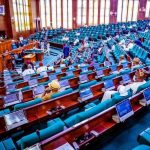The number of industrial accidents in Nigeria that result in death, disfigurement, and incapacitation among other consequences has increased, making the country’s hazardous working environment worrisome.
The worst thing about the Nigerian situation is that the regulatory bodies don’t appear to want to confront the hazardous and inhumane conditions head-on.
The maritime business claimed the lives of Adeyemi Aderounmu, Patrick Ikenwe, Augustine Nwamba, Tukur Mohammed Kabiru Labaran, Adebanjo Adeyemi, and Yusuf Akeem recently.
The industry has also documented multiple instances of worker incapacitation and maiming. There are a substantial number of occupational accident deaths in the textile industry.
Mr. Ayodele Amusan lost his left palm in an industrial accident at ITI Process House Lagos on March 9, 2000; Mr. John Onyemah suffered severe injuries to his vertebral column when a gate collapsed on him at work on September 15, 2000; and Mr. Shola Odunleye suffered burns on January 24, 1999, after a stem accidentally spread on him at ITI Process House, Lagos.
Mr. Emmanuel Olutsosoye lost his finger in an industrial accident at First Spinners PLC on February 6, 2002. Mr. Ali Oloche suffered abrasions to his two left fingers in an industrial accident at the same company on September 12, 2000. Mr. Kareem Aderemi suffered abrasions to his two right fingers in an industrial accident on June 26, 2002. Mr. Rasheed Quadris suffered abrasions to his right fingers in an industrial accident on March 3, 2000.
On March 3, 2000, there was an industrial accident at First Spinners PLC that resulted in a small skin abrasion for Mr. Oke Olakunle and a little abrasion for Mr. Rasheed Quadris on his right fingers.
Regretfully, Mr. Ekuma Sunday of United Nigeria Textile LTD passed away the day after he tragically slumped at work on September 6, 2010.
Recall that on July28,2020, Mr. Richard Gbadebo, a worker with Expand Global Industries Limited and Henkel Nigeria Limited, in the Oluyole Industrial Estate in Ibadan, Oyo State, passed away under suspicious circumstances while using a machine.
Similar to this, on April 26, 2022, Temidayo Kayode, who was working for Yanou Industry Nigeria Limited at the time, suffered severe injuries to his left hand on Taiwo Eyinede Street, Lagos-Ibadan Expressway, Ibafon, Ogun State, which ultimately resulted in the amputation of the hand.
Regretfully, there are yet others who are not mentioned. Therefore, Joe Ajaero, President of the Nigeria Labour Congress (NLC), addressed the topic of unsafe working environments in Nigeria extensively during the July 8, 2024, national retreat on labor reforms and the pursuit of a living wage in Nigeria: An emphasis on legislative interventions, which was organized by the National Institute for Legislative and Democratic Studies.
Among others, Ajaero said: “As we gather here today, we are reminded of the challenges that have long plagued the Nigerian workforce. Inadequate wages, rising inflation, and an ever-increasing cost of living, have eroded our purchasing power. The increasing state-led intimidation, harassment and impunity deliberately orchestrated against workers and their organisations with the intention of muzzling their voices and deepening their exploitation.
“Workplaces are becoming increasingly insecure because limbs are mercilessly chopped off and lives are destroyed as a result of unsafe work environment. These conditions not only undermine the well-being of our families but also stifle the potential for economic growth and social stability.
“Just two days ago, (Saturday, July 7, 2024) along Sagamu – Ogijo highway, Ogun State, Yahaya Ibrahim, a 27-year-old Nigerian worker of KAM Steel integrated company was crushed to death allegedly by a Roller machine he was operating around 4:00am. He is one of the many cases of Nigerians who have lost their lives because they went to work.
Most of these cases may be the result of the failure of the legislature to oversight the Federal Ministry of Labour that is supposed to monitor such workplaces. It also may be a result of inadequacy of our laws in safeguarding Nigerians while at work. Workers are owed Pensions when they retire and are abandoned. Retirees are owed nearly N300billion by the Federal Government alone. If you add the state governments and indeed, the private sector, it will become mindboggling. One may ask: where are the laws?
“In addressing these challenges, legislative interventions play a crucial role. Our lawmakers bear the responsibility of enacting policies that protect the rights and welfare of workers. It is through robust, thoughtful, and forward-looking legislation that we can create an environment where every Nigerian worker earns a wage that meets their basic needs and supports a decent standard of living.
“It is important that our Lawmakers are reminded of their sacred roles in nation building. It is in demonstrating a deep understanding of these duties and committing to discharging them effectively that our workplaces and truly our nation will make progress. A nation with a passionate and strong Legislature is shielded from Executive Lawlessness and excesses but where the Legislature allows itself to be compromised and weakened it becomes an accomplice to the undermining of democracy and destruction of our nation.
I would like to use this occasion to remind the NASS of two very important roles that it plays in helping Nigerian workers and our workplaces become more productive and decent work complying, which will help propel our country’s prosperity. These include the duty to enact laws that promote Nigeria’s peace, order, and good governance as well as the supervision of the executive branch to guarantee that policies are carried out correctly and resources are allocated efficiently.




